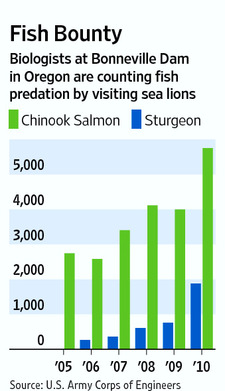forum
library
tutorial
contact

Latest Score in Sea Lion Battle: Feds, 1; State, 0
by Raymond RendlemanWest Linn Tidings, August 11, 2011
|
the film forum library tutorial contact |

|
Latest Score in Sea Lion Battle: Feds, 1; State, 0by Raymond RendlemanWest Linn Tidings, August 11, 2011 |
 The federal government recently dealt a blow to local politicians and Willamette Falls sport fishers when it revoked Oregon's authorization to kill California sea lions.
The federal government recently dealt a blow to local politicians and Willamette Falls sport fishers when it revoked Oregon's authorization to kill California sea lions.
Advocates from the Oregon City and West Linn area had hoped that legal trapping and euthanizing of sea lions would spread this direction from Bonneville, but the National Marine Fisheries Service has at least delayed the killing of sea lions in Clackamas County following lawsuits filled by the Humane Society of the United States and the Wild Fish Conservancy.
State Rep. Dave Hunt, D-Gladstone, expects that the federal agency will approve a renewed Oregon Department of Fish and Wildlife application to euthanize sea lions in time for the 2012 fishing season. During the next two seasons, ODFW will continue nonlethal hazing of sea lions at Willamette Falls, but Hunt and his supporters see legal hurdles at Bonneville as preliminary to fulfilling Clackamas County interests.
Meanwhile, wildlife protection groups in recent weeks celebrated a new lease on life for hundreds of sea lions that eat primarily endangered native salmon and other fish species. Environmentalists won a previous appeal by arguing sea lions eat 4.2 percent of adult salmon and steelhead runs, while fishing accounted for as much as 17 percent.
"It's time to face the fact that killing sea lions doesn't do anything for salmon, and focus instead on real salmon conservation threats, like hydropower and commercial fishing," said Jonathan R. Lovvorn, Humane Society chief counsel for animal protection.
Hunt, however, believes differently.
"That is not factual and is frankly ridiculous - California sea lions clearly kill endangered salmon, and removing sea lions will clearly save salmon," he said in response.

Hunt plans to continue his support for legislating stricter regulations on commercial fishing, where he sees "unnecessarily large impacts" on salmon habitat. However, hydropower is, in Hunt's view, a backbone of the local economy that provides renewable energy while preventing floods.
"Unlike the dams, which add significant value, the sea lions provide absolutely nothing," Hunt said.
Blaming sea lions is just a "distraction" from more politically difficult ways to protect salmon, according to Kurt Beardslee, executive director of Wild Fish Conservancy, who wants a focus on dam operations, over-harvesting, hatchery practices and stocking non-native fish.
"Addressing a single one of these pervasive problems would help salmon far more than killing sea lions at Bonneville," Beardslee said.
Hunt pointed to millions of dollars spent on hatchery and fish-ladder technologies that would be wasted if sea lions were ignored.
"Again, it's not a distraction at all, and there are and will continue to be very aggressive measures taken to improve hatcheries and dams," Hunt said. "My approach, and most reasonable people's approach, is to focus on everything: fisheries, hydro and these (sea lion) predators."
Humane Society officials point out sea lions have been part of Oregon's natural habitat for thousands of years, but the natural balance also used to involve humans removing sea lions.
Eirik Thorsgard, an archeologist for the Confederated Tribes of Grand Ronde, said he looked forward to working with federal and state officials to restore traditional American Indians practices for killing Willamette River sea lions using harpoons from canoes.
"If people want to talk about historical practices, then those were the historical practices that kept things in balance," Hunt said.
Related Pages:
Survival of Snake River Salmon & Steelhead Data compiled July 2004 by www.bluefish.org
learn more on topics covered in the film
see the video
read the script
learn the songs
discussion forum
